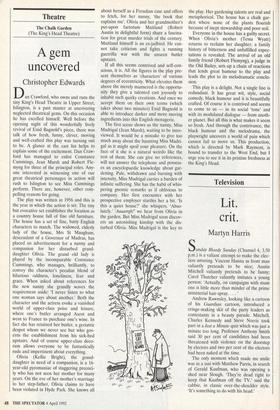Theatre
The Chalk Garden (The King's Head Theatre)
A gem uncovered
Christopher Edwards
Dan Crawford, who owns and runs the tiny King's Head Theatre in Upper Street, Islington, is a past master at uncovering neglected theatrical gems. On this occasion he has excelled himself. Well before the opening night of this wonderfully lively revival of Enid Bagnold's piece, there was talk of how fresh, funny, clever, moving and well-crafted this play was turning out to be. A glance at the cast list helps to explain some of the excitement. Dan Craw- ford has managed to enlist Constance Cummings, Jean Marsh and Robert Fle- myng for three of the principal roles. Any- one interested in witnessing one of our great theatrical personages in action will rush to Islington to see Miss Cummings perform. There are, however, other com- pelling reasons for going.
The play was written in 1956 and this is the year in which the action is set. The tiny but evocative set establishes the location as a country house full of fine old furniture. The house has a set of fine, batty English characters to match. The widowed, elderly lady of the house, Mrs St Maugham, descendant of a Governor of Madras, has placed an advertisement for a nanny and companion for her disturbed grand- daughter Olivia. The grand old lady is played by the incomparable Constance Cummings, who manages, brilliantly, to convey the character's peculiar blend of hilarious oddness, loneliness, fear and grace. When asked about references for the new nanny she grandly waves the requirement aside: 'I never listen to what one woman says about another.' Both the character and the actress evoke a vanished world of upper-class poise and leisure, where one's butler arranged Ascot and went to France to purchase one's wine. In fact she has retained her butler, a geriatric despot whom we never see but who gov- erns the establishment from his sick-bed upstairs. And of course upper-class deco- rum allows everyone to be fantastically rude and impertinent about everything.
Olivia (Kellie Bright), the grand- daughter in need of a companion, is a 16- year-old pyromaniac of staggering precoci- ty who has not seen her mother for many years. On the eve of her mother's marriage to her step-father, Olivia claims to have been violated in Hyde Park. She knows all about herself as a Freudian case and offers to fetch, for her nanny, 'the book that explains me'. Olivia and her grandmother's put-upon factotum Maitland (Robert Austin in delightful form) share a fascina- tion for great murder trials of the century. Maitland himself is an ex-jailbird. He can- not take criticism and fights a running guerrilla war with the unseen butler upstairs.
If all this seems contrived and self-con- scious, it is. All the figures in the play pre- sent themselves as 'characters' of various degrees of eccentricity. What elevates them above the merely mannered is the opportu- nity they give a talented cast joyously to inhabit such quirky creations. And once we accept them on their own terms (which takes about two minutes) Enid Bagnold is able to introduce darker and more moving ingredients into this English menagerie.
The first scene shows us the nanny, Miss Madrigal (Jean Marsh), waiting to be inter- viewed. It would be a mistake to give too much away about the haunting Miss Madri- gal as it might spoil your pleasure. On the face of it she is a natural weirdo like the rest of them. She can give no references, will not answer the telephone and possess- es an encyclopaedic knowledge about gar- dening. Pale, withdrawn and burning with intensity, Miss Madrigal carries a burden of infinite suffering. She has the habit of whis- pering gnomic remarks as if oblivious to company. Her first encounter with her prospective employer startles her a bit. 'Is this a quiet house?' she whispers. 'Abso- lutely.' Aaaarrgh!' we hear from Olivia in the garden. But Miss Madrigal soon discov- ers an astonishing kinship with the dis- turbed Olivia. Miss Madrigal is the key to the play. Her gardening talents are real and metaphorical. The house has a chalk gar- den where none of the plants flourish because of inept stewardship and poor soil.
Everyone in the house has a guilty secret. When Olivia's mother (Tessa Wyatt) returns to reclaim her daughter, a faMily history of bitterness and unfulfilled expec- tations is revealed. The arrival of an old family friend (Robert Flemyng), a judge in the Old Bailey, sets up a chain of reactions that lends great humour to the play and leads the plot to its melodramatic conclu- sion.
This play is a delight. Not a single line is redundant. It has great wit, style, social comedy, black humour and it is beautifully crafted. Of course it is contrived and seems to come to us — in its social 'tone' and with its modulated dialogue — from anoth- er planet. But all this is what makes it seem so fresh. And through the contrivance, the black humour and the melodrama, the playwright uncovers a world of pain which cannot fail to move us. This production, which is directed by Mark Rayment, is bound to transfer to the West End, but I urge you to see it in its pristine freshness at the King's Head.


























































 Previous page
Previous page